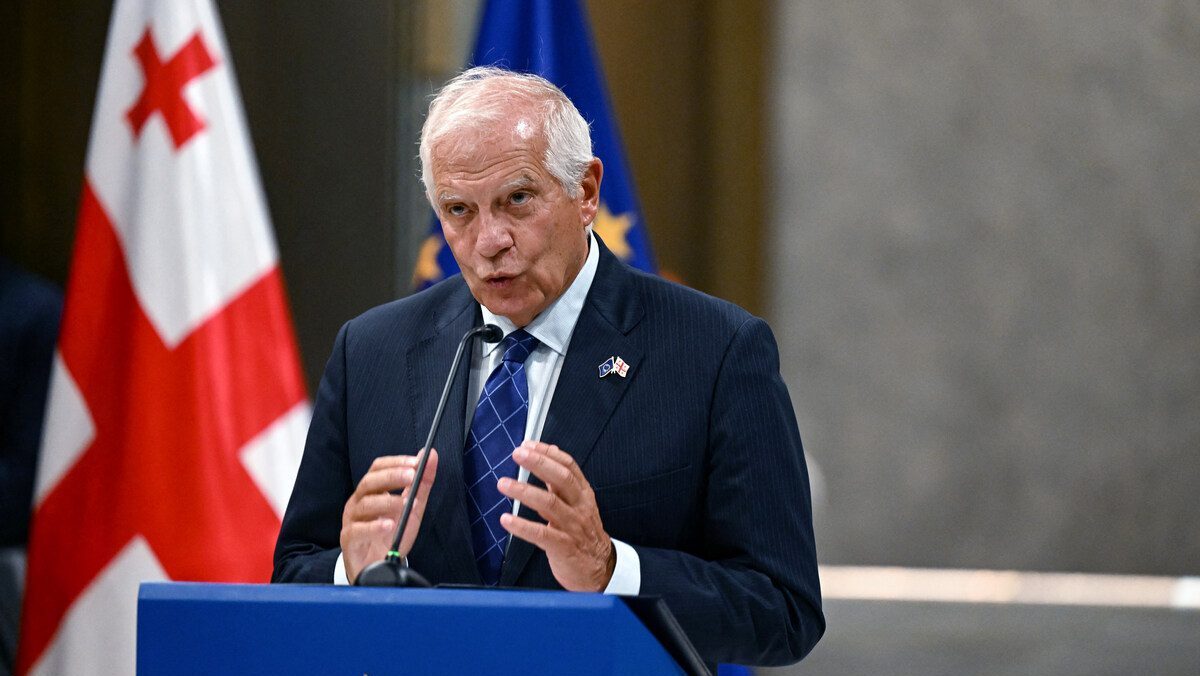
European Union High Representative for Foreign Affairs and Security Policy Josep Borrell gives a press conference at the EU office in Tbilisi on September 7, 2023.
Photo: STRINGER / AFP
The EU’s top diplomat Josep Borrell touched down in Tbilisi, Georgia, on Thursday September 7th, in the hopes of advancing Georgia’s beleaguered EU membership bid. The country is being criticised by liberal civil society groups for authoritarianism and business ties with Moscow. LGBT groups have also turned their ire on Georgia after a gay pride parade was attacked in July by right-wing nationalists led by members of the Orthodox clergy.
Engaged in a border dispute with Russian-backed separatists since its independence in 1992, Georgia applied for EU membership in March 2022 but has had its bid frustrated by the European Commission, which demands greater reforms in the area of press and judicial freedom, as well as the “deoligarchisation” of the Georgian economy.
An attempted clampdown on Western NGOs in March by the ruling Georgian Dream party resulted in intense street battles between the government and pro-EU groups, strongly indicating that popular sentiment favours integration with Europe despite lingering Russophile sympathies in the country’s political and economic establishment.
🔴LIVE NOW: HR/VP @JosepBorrellF joint press conference with Prime Minister of Georgia @GharibashviliGe https://t.co/58kBtjPBas
— European External Action Service – EEAS 🇪🇺 (@eu_eeas) September 8, 2023
In discussions with officials in Tbilisi, Borrell warned that Georgia had a lot more to do before it could progress with its membership bid, as the Georgian government juggles strategic ambitions of joining the EU and NATO with the security risk from its Russian neighbour and pro-Kremlin oligarchs.
The EU will have to decide whether Georgia has met its rule of law obligations by October, as Tbilisi is accused of being a major hub for Russian companies attempting to bypass Western sanctions.
A major bone of contention between the EU and Georgia not mentioned during Borrell’s visit is the ongoing imprisonment of former President Mikheil Saakashvili, who is fighting for his life while under arrest on what he views as trumped-up corruption charges.
A Europhile reformist and advocate of NATO membership, Saakashvili took office after the so-called Rose Revolution of 2003 that overthrew Georgia’s then Russian-backed government. He proceeded to lose power after a disastrous border war with Russia in 2008, which led to him being voted out in 2013 and banished to Ukraine.
The current Georgian Prime Minister Irakli Garibashvili has attracted negative attention in the West for his support for Russia’s invasion of Ukraine. In a piece entitled “The Orbanizing of Georgia,” the pro-Atlanticist think-tank Carnegie Europe recently tried to stoke fears that the country could be following in the political footsteps of Orbán’s Hungary.
Garibashvili is a known ally of Budapest’s ruling Fidesz government and travelled to Budapest to speak at the Conservative Political Action Conference (CPAC) conference in May, where he decried the rise of gender ideology in Europe.
I am delighted to welcome @JosepBorrellF, EU High Representative, to Georgia. As we get closer to the historic moment of obtaining the EU candidate status, this very timely visit is yet another vivid demonstration of EU's firm support for Georgia's European integration. pic.twitter.com/HICtZxPtPs
— Ilia Darchiashvili (@iliadarch) September 7, 2023
Since the war in Ukraine, the EU has been accelerating the membership application process for multiple Balkans and Eastern European countries in the hopes of stemming Russian geopolitical influence. In support of this policy, the Open Society Foundation pledged to take a leading role in ensuring the liberalisation process in the region during the accession process.
